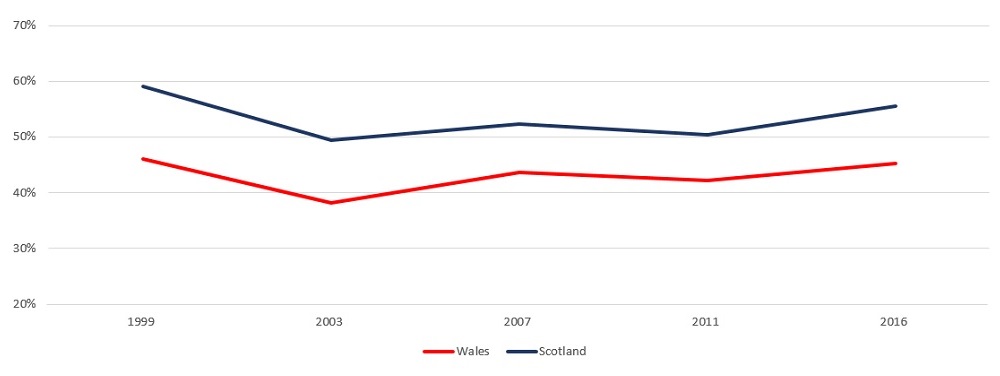Wales should make voting compulsory, say Labour AMs

Voting at National Assembly elections should be made compulsory, according to Welsh Labour AMs.
Jeremy Miles, AM for Neath, said Wales should copy the example of countries such as Australia, where citizens can be fined for not voting, in order to boost turnout.
He told Newyddion 9 that he was “personally persuaded that it’s the right way to go” but that there had “not been a very wide debate” about it in Wales.
Mr. Miles added that there should be a right to abstain when filling in the ballot paper for those who did not wish to support any politician or party.
Fellow Labour AM Lee Waters backed his idea. However, the First Minister said it was a “cop out” and that it was the responsibility of politicians to increase turnout.

Analysis
by Ifan Morgan Jones
Engagement with the Welsh Assembly is crucial and compulsory voting needs to be one option on the table to solve that problem.
It would not, however, solve another, larger problem, which is that many of the people of Wales are fundamentally ignorant about what goes on at the National Assembly.
A survey by the BBC/ICM in 2014 found that there was widespread confusion about what powers were devolved to the Welsh Assembly, with only 48% correctly identifying that health was a devolved matter, and 42% wrongly believing they had control over policing.
Forcing people who do not feel they have all the facts to vote could lead to some very odd decisions, which may not be in Wales’ best interests.
Support our Nation today
For the price of a cup of coffee a month you can help us create an independent, not-for-profit, national news service for the people of Wales, by the people of Wales.






It’s crucial to increase real turn out, without compromising the system, as postal votes can do. We need the debate.
Are you suggesting that postal votes allow electoral fraud? No system is perfect; for example electronic voting can be HACKED and none of us like HACKING do we?
In countries where electronic voting is used, and I’m assuming you mean voting machines, as are used in the USA, and Venezuela, for example. Most of us are aware that there have been questions asked about the results in places like Texas, due to the use of voting machines, but an online friend of mine described one of the arguments over the use of voting machines in Venezuela where there were widespread concerns about the use of closes source software provided, I believe, by Siemens. The argument that open source software, running on Linux should have been used, as the… Read more »
Telling people what to do with threat of a fine is not encouragement it’s enforcement.
I lived and voted in Australia for many years, and I don’t believe that compulsory voting is the answer. Forcing them to turn up at voting booths just leads to people voting “informally”, i.e. spoiling their ballot paper in some way by writing other things on it, or just folding it and putting it in the box without writing anything. Making voting compulsory doesn’t mean that people will actually consider the issues and make a thoughtful vote. What is needed is to make politics more interesting so people become engaged. Ifan’s point about people being confused is right. I know… Read more »
The education issue has to be solved first. We already have a framework for this in school and colleges and other learning providers and on paper it sounds good (see below) but it gets given lip service because our whole education system has gone for broad-not-deep in terms of curriculum and these ‘cross cutting themes’ are often introduced un-funded and un-measured and thus have the level of implementation you’d expect as a result… Learners should Understand: • the electoral procedures, processes and powers of local, national, European and international political systems • the main policies of the major UK political… Read more »
I could see it made into part of “Key Skills” in Schools and Colleges… maybe not to the extent you’re suggesting though. People would certainly have more use for it than many of the things they have to learn. That said… I don’t think our education system is to blame for lack of engagement in politics… its that up until this last election the Tories and Labour have been very close in what they’re offering – their differences predominantly being superficial.
I think you’ve misread me. The text I quoted above is ALREADY in the curriculum. It’s just not given enough time or funding to be more than lipservice and doesn’t turn out pupils who know the things it’s says they should know.
My mistake. Was not aware they even did this… don’t think they ever did it when I was at school/college which wasn’t all that long ago.
You could be forgiven for thinking it’s still not – as I say, it’s not well or consistently taught.
If you want to make voting compulsory, the voter needs a way to express “no confidence in the options I have been offered” and for that option to be meaningful.
National Assembly turnout in 2016 was 45% of those registered to vote (and voter registration in Wales is low, so fewer than 45% of those entitled to vote). If those forced to vote against their will had voted in the first past the post element of the Assembly Election the result could have been frightening. Compulsory voting without STV could result in a very unstable government, possibly UKIP lead (as UKIP appeared to be the “f***them all party” in 2016) I dislike compulsory voting in principle, candidates should enthuse me to vote for them, I shouldn’t be forced to vote… Read more »